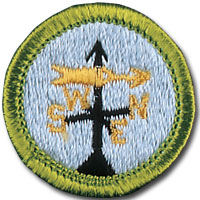H.A.C. -Weather Traditional Geocache
-
Difficulty:
-

-
Terrain:
-

Size:  (regular)
(regular)
Please note Use of geocaching.com services is subject to the terms and conditions
in our disclaimer.

Weather
This area is open to public hunting. Please blaze it at the very
least or wait to hunt this until hunting season is over. The
cache is located at Wildcat Den. This is a neat park to visit.
There is a disc golf course you can play on while on your way to
the cache. You will be looking for a 30 cal ammo can. The leaves
where all off the trees when I placed this and at the cache
location it was a nice view of the river. Please write about
your trip in the log book instead of just signing and dating it.
That is what it is meant for. Happy caching!!!
Meteorology is the study of Earth's atmosphere and its weather and
the ways in which temperature, wind, and moisture act together in
the environment. In addition to learning how everyday weather is
predicted, Scouts can learn about extreme weather such as
thunderstorms, tornadoes, and hurricanes, and how to stay
safe.
Requirements for the badge not the cache:
1. Define meteorology. Explain what weather is and what climate is.
Discuss how the weather affects farmers, sailors, aviators, and the
outdoor construction industry. Tell why weather forecasts are
important to each of these groups.
2. Name five dangerous weather-related conditions. Give the safety
rules for each when outdoors and explain the difference between a
severe weather watch and a warning. Discuss the safety rules with
your family.
3. Explain the difference between high and low pressure systems in
the atmosphere. Tell which is related to good and to poor weather.
Draw cross sections of a cold front and a warm front, showing the
location and movements of the cold and warm air, the frontal slope,
the location and types of clouds associated with each type of
front, and the location of precipitation.
4. Tell what causes wind, why it rains, and how lightning and hail
are formed.
5. Identify and describe clouds in the low, middle, and upper
levels of the atmosphere. Relate these to specific types of
weather.
6. Draw a diagram of the water cycle and label its major processes.
Explain the water cycle to your counselor.
7. Define acid rain. Identify which human activities pollute the
atmosphere and the effects such pollution can have on people.
8. Do ONE of the following:
-Make one of the following instruments: wind vane, anemometer, rain
gauge, hygrometer. Keep a daily weather log for one week using
information from this instrument as well as from other sources such
as local radio and television stations, NOAA Weather Radio, and
Internet sources (with your parent's permission). Record the
following information at the same time every day: wind direction
and speed, temperature, precipitation, and types of clouds. Be sure
to make a note of any morning dew or frost. In the log, also list
the weather forecasts from radio or television at the same time
each day and show how the weather really turned out.
-Visit a National Weather Service office or talk with a local radio
or television weathercaster, private meteorologist, local
agricultural extension service officer, or university meteorology
instructor. Find out what type of weather is most dangerous or
damaging to your community. Determine how severe weather and flood
warnings reach the homes in your community.
9. Do ONE of the following:
-Give a talk of at least five minutes to a group (such as your unit
or a Cub Scout pack) explaining the outdoor safety rules in the
event of lightning, flash floods, and tornadoes. Before your talk,
share your outline with your counselor for approval.
-Read several articles about acid rain and give a prepared talk of
at least five minutes to a group (such as your unit or a Cub Scout
pack) about the articles. Before your talk, share your outline with
your counselor for approval.
10. Find out about a weather-related career opportunity that
interests you. Discuss with and explain to your counselor what
training and education are required for such a position, and the
responsibilities required of such a position.
 "http://img.geocaching.com/cache/9429f439-15d0-4b32-b5d6-3ebaa51c475c.jpg"border="0"
/>
"http://img.geocaching.com/cache/9429f439-15d0-4b32-b5d6-3ebaa51c475c.jpg"border="0"
/>
Additional Hints
(No hints available.)